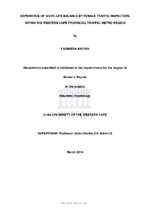Experience of work-life balance by female traffic inspectors within the Western Cape provincial traffic: Metro region
Abstract
Twenty-first century organisations have become more conscious of implementing work-life balance practices due to the fusion of females into the labour market, the existence of double career couples with children and equality gender. Several studies around work-life balance has been embarked upon, however, the perception of female traffic officers within the South African environment has not yet been explored.
The present study seeks to understand and provide female traffic inspectors with better insights about how they are currently experiencing work and home life through self-awareness. A phenomenological approach based on a research design of inquiry was used to engage with female traffic inspectors and to obtain their experience, as well as its impact. The sample used for this study consisted of six female traffic inspectors from the Western Cape Government, Department of Transport and Public Works: Metro Region. The current research used one research instrument namely in-depth interview to address the research question using semi-structured, audio-taped interviews.
Recurring themes that emerged from the study indicate that female traffic inspectors’ experience of work-life balance challenges involved job stress, work support, organisational culture and the work environment. These challenges have impacted on their work life and family life which gave rise to inter-role conflict, work-to-family conflict and family-to-work conflict, which negatively impacted on their attitude in attempting to adapt to their work environment. It became evident that most of the participants were finding it difficult to balance work and family as they realise that “something had to give”.

